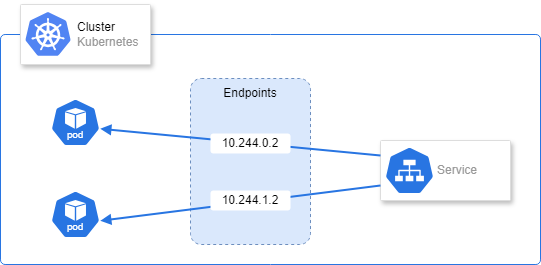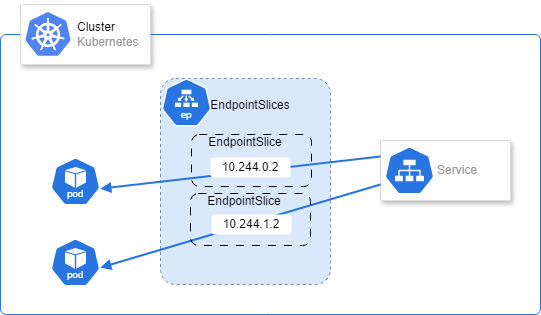Kubernetes - Endpoints
Alasta 9 Septembre 2024 kubernetes kubernetes endpoints
Description : Kubernetes, les endpoints et endpointslices
Kubernetes - Les endpoints
Le endpoint est “l’interface” entre le service et les pods associés.
C’est une collection d’IP et ports exposé par les pods.
Quand un service est créé, Kubernetes crée automatiquement et associe un endpoint.
L’objet endpoint maintient les IP et port des pods (ajout/suppression/changement) qui matche le selector du service.

Afficher les endpoints
k get endpoints
NAME ENDPOINTS AGE
hello 10.244.0.2:80,10.244.1.2:80 20dk describe endpoints hello
Name: hello
Namespace: default
Labels: <none>
Annotations: endpoints.kubernetes.io/last-change-trigger-time: 2024-09-09T18:12:43Z
Subsets:
Addresses: 10.244.0.2,10.244.1.2
NotReadyAddresses: <none>
Ports:
Name Port Protocol
---- ---- --------
<unset> 80 TCP
Events: <none>k get endpoints hello -o yaml
apiVersion: v1
kind: Endpoints
metadata:
annotations:
endpoints.kubernetes.io/last-change-trigger-time: "2024-09-09T18:12:43Z"
creationTimestamp: "2024-08-20T15:47:51Z"
name: hello
namespace: default
resourceVersion: "154998"
uid: d614cd15-2494-4204-95fe-74ea5af1c8bf
subsets:
- addresses:
- ip: 10.244.0.2
nodeName: minikube
targetRef:
kind: Pod
name: hello-7865c89f4d-qwgwj
namespace: default
uid: 04ab4041-de8e-4973-b16a-2fd84cc72f5a
- ip: 10.244.1.2
nodeName: minikube-m02
targetRef:
kind: Pod
name: hello-7865c89f4d-4sxlm
namespace: default
uid: 4716ec44-351e-4bed-a35b-44617d6370f5
ports:
- port: 80
protocol: TCPNote: une ressource endpoint a une limitation à 1000 backend endpoints (pods), pour répondre à ce problème Kubernetes à ajouté le endpointSlice depuis la v1.21.
Cela génére aussi des volumes dans la base ETCD.
Les endpointSlices
 Les endpointSlices permettent d’aller au dela des 1000 endpoints backend (pods) par endpoint, par défaut il y a 100 pods par endpointslice, c’est possible de le modifier via le flag –max-endpoints-per-slice à la configuration du kube-controller-manager.
Les endpointSlices permettent d’aller au dela des 1000 endpoints backend (pods) par endpoint, par défaut il y a 100 pods par endpointslice, c’est possible de le modifier via le flag –max-endpoints-per-slice à la configuration du kube-controller-manager.
k get endpointslices
NAME ADDRESSTYPE PORTS ENDPOINTS AGE
hello-lqqm2 IPv4 80 10.244.0.2,10.244.1.2 20dk get endpointslices hello-lqqm2 -o yaml
addressType: IPv4
apiVersion: discovery.k8s.io/v1
endpoints:
- addresses:
- 10.244.0.2
conditions:
ready: true
serving: true
terminating: false
nodeName: minikube
targetRef:
kind: Pod
name: hello-7865c89f4d-qwgwj
namespace: default
uid: 04ab4041-de8e-4973-b16a-2fd84cc72f5a
- addresses:
- 10.244.1.2
conditions:
ready: true
serving: true
terminating: false
nodeName: minikube-m02
targetRef:
kind: Pod
name: hello-7865c89f4d-4sxlm
namespace: default
uid: 4716ec44-351e-4bed-a35b-44617d6370f5
kind: EndpointSlice
metadata:
annotations:
endpoints.kubernetes.io/last-change-trigger-time: "2024-09-09T18:12:43Z"
creationTimestamp: "2024-08-20T15:47:51Z"
generateName: hello-
generation: 59
labels:
endpointslice.kubernetes.io/managed-by: endpointslice-controller.k8s.io
kubernetes.io/service-name: hello
name: hello-lqqm2
namespace: default
ownerReferences:
- apiVersion: v1
blockOwnerDeletion: true
controller: true
kind: Service
name: hello
uid: cd7da9c9-9d55-4d6a-8dee-29019c40091c
resourceVersion: "154997"
uid: 16d512b5-29f5-4e8c-8b56-182b7b01e9ef
ports:
- name: ""
port: 80
protocol: TCPk describe endpointslices hello-lqqm2
Name: hello-lqqm2
Namespace: default
Labels: endpointslice.kubernetes.io/managed-by=endpointslice-controller.k8s.io
kubernetes.io/service-name=hello
Annotations: endpoints.kubernetes.io/last-change-trigger-time: 2024-09-09T18:12:43Z
AddressType: IPv4
Ports:
Name Port Protocol
---- ---- --------
<unset> 80 TCP
Endpoints:
- Addresses: 10.244.0.2
Conditions:
Ready: true
Hostname: <unset>
TargetRef: Pod/hello-7865c89f4d-qwgwj
NodeName: minikube
Zone: <unset>
- Addresses: 10.244.1.2
Conditions:
Ready: true
Hostname: <unset>
TargetRef: Pod/hello-7865c89f4d-4sxlm
NodeName: minikube-m02
Zone: <unset>
Events: <none>